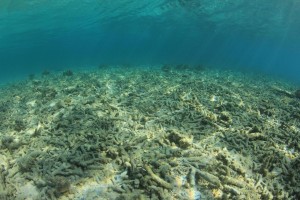
A Silent Threat: Ocean Acidification in the UAE and other GCC countries
The Arabian and Oman Gulf, a vibrant marine ecosystem teeming with life, faces a silent threat – ocean acidification. Our oceans play a vital role in regulating the Earth's climate. They act as a giant "carbon sink," absorbing roughly a quarter of the carbon dioxide (CO2) released from human activities. However, this CO2 reacts with seawater, forming carbonic acid, which alters the ocean's natural chemical balance. This process, known as ocean acidification, makes the ocean more acidic, impacting marine organisms that rely on specific pH levels for vital functions.
The primary driver of ocean acidification is the burning of fossil fuels, releasing vast amounts of CO2 into the atmosphere. Deforestation, another pressing environmental concern, exacerbates the problem by reducing natural CO2 sequestration by trees. These human activities are pushing ocean acidity to levels unseen in millions of years.
The Arabian and Oman Gulf are particularly vulnerable to ocean acidification mainly for two reasons. The first one is that the Arabian Gulf compared to the open ocean, is a shallow basin with limited water exchange. This reduced circulation traps CO2, leading to a faster acidification rate. The second one, is that warmer water absorbs less CO2, and the Arabian and Oman Gulf already experience high temperatures. This further intensifies the acidification process.
As ocean acidification increases, it disrupts the ability of many marine organisms to build their shells and skeletons from calcium carbonate. This spells trouble for shellfish like oysters, mussels, and clams, hindering their growth, reproduction, and ultimately, survival. Corals, are especially vulnerable. Acidic seas weaken their skeletons, hindering reef growth and making them susceptible to wave and storm damage. Bleaching events, driven by rising temperatures and the stress of changing water chemistry, further threaten these crucial ecosystems. Even tiny zooplankton are affected, with some species struggling to build their calcium carbonate shells, potentially impacting fish populations that rely on them for food.
The decline of these organisms creates a domino effect throughout the marine ecosystem. Weakened coral reefs offer less protection for fish, reduced zooplankton disrupt the food web, and fewer shellfish impact commercially important fisheries. The economic consequences of a degraded marine ecosystem are severe. Fisheries, tourism reliant on healthy coral reefs, and even coastal protection from storms all suffer when the delicate balance of the ocean is disrupted.
At the Marine Research Lab of the Fujairah Research Center, we are beginning a program to monitor the acidification of the sea in the Fujairah Emirate. By working together, we can minimize the threat of ocean acidification and ensure the Oman Gulf continues to be a vibrant haven for marine life.
